University Name: Forensic Accounting Literature Review and Analysis
VerifiedAdded on 2022/11/18
|11
|2423
|168
Literature Review
AI Summary
This literature review examines the critical role of forensic accounting in preventing and detecting accounting scandals within organizations. It analyzes four articles, highlighting the evolution of forensic accounting theories and the increasing need for its implementation due to rising accounting frauds globally. The review summarizes common findings, such as the importance of a robust forensic accounting system for ensuring financial statement transparency, and different methodologies employed across the articles, including the net worth method and comparisons with corporate governance. Furthermore, it discusses managerial implications, limitations in the scope of the articles regarding practical implementation, and suggests directions for future research focusing on practical application and implementation strategies. The review underscores the necessity of forensic accounting in maintaining ethical accounting practices and investor confidence.
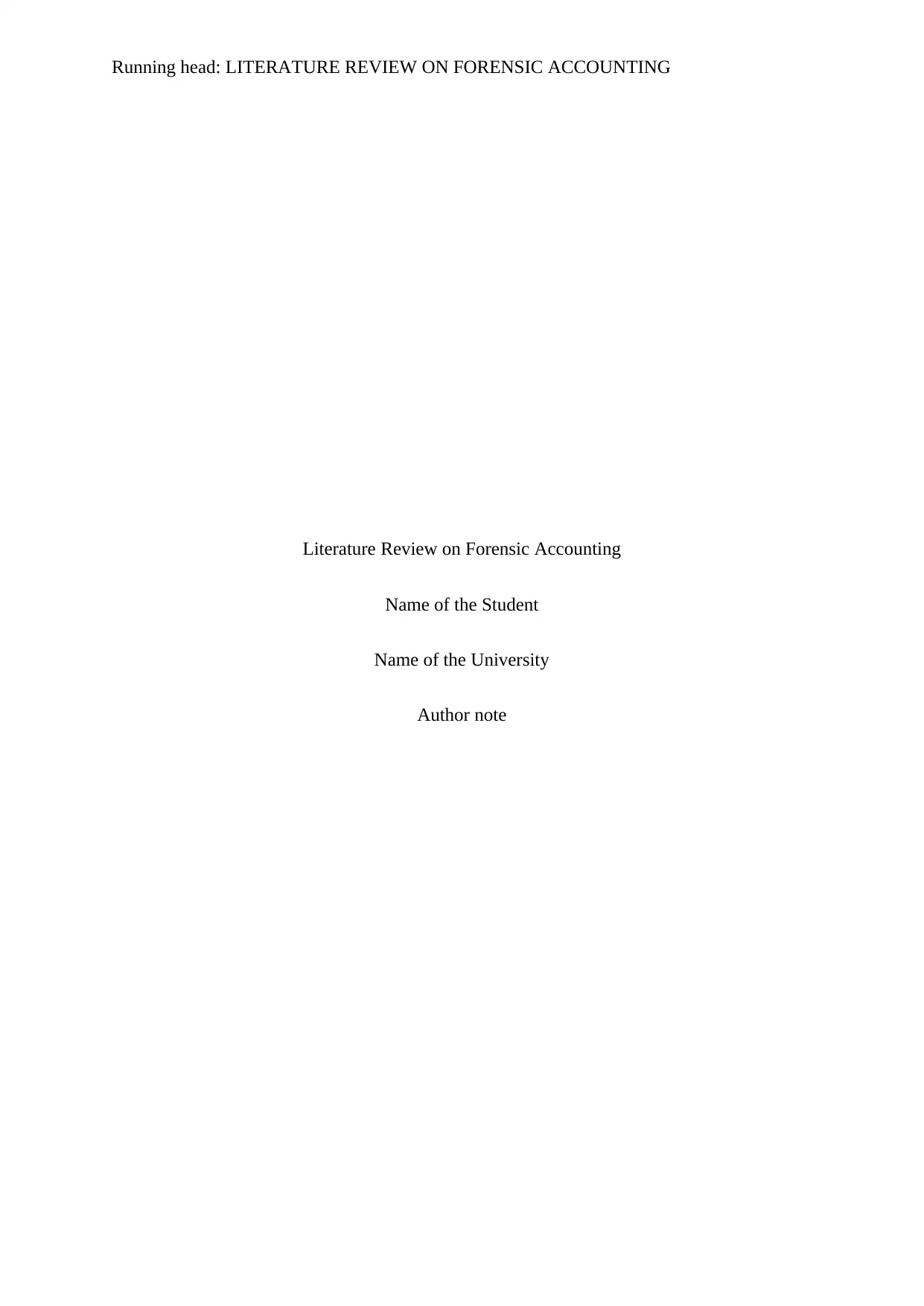
Running head: LITERATURE REVIEW ON FORENSIC ACCOUNTING
Literature Review on Forensic Accounting
Name of the Student
Name of the University
Author note
Literature Review on Forensic Accounting
Name of the Student
Name of the University
Author note
Paraphrase This Document
Need a fresh take? Get an instant paraphrase of this document with our AI Paraphraser
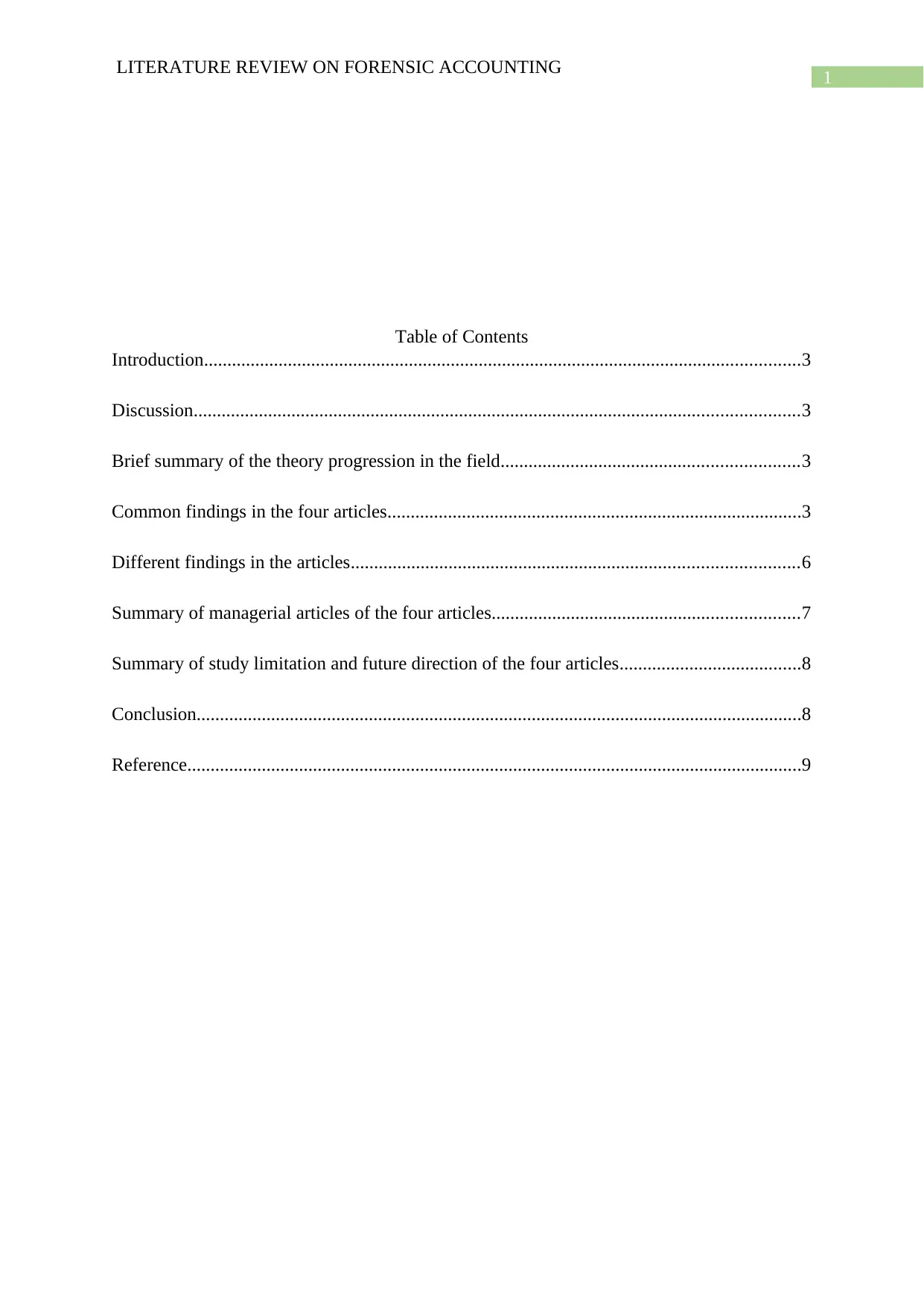
1
LITERATURE REVIEW ON FORENSIC ACCOUNTING
Table of Contents
Introduction................................................................................................................................3
Discussion..................................................................................................................................3
Brief summary of the theory progression in the field................................................................3
Common findings in the four articles.........................................................................................3
Different findings in the articles................................................................................................6
Summary of managerial articles of the four articles..................................................................7
Summary of study limitation and future direction of the four articles.......................................8
Conclusion..................................................................................................................................8
Reference....................................................................................................................................9
LITERATURE REVIEW ON FORENSIC ACCOUNTING
Table of Contents
Introduction................................................................................................................................3
Discussion..................................................................................................................................3
Brief summary of the theory progression in the field................................................................3
Common findings in the four articles.........................................................................................3
Different findings in the articles................................................................................................6
Summary of managerial articles of the four articles..................................................................7
Summary of study limitation and future direction of the four articles.......................................8
Conclusion..................................................................................................................................8
Reference....................................................................................................................................9
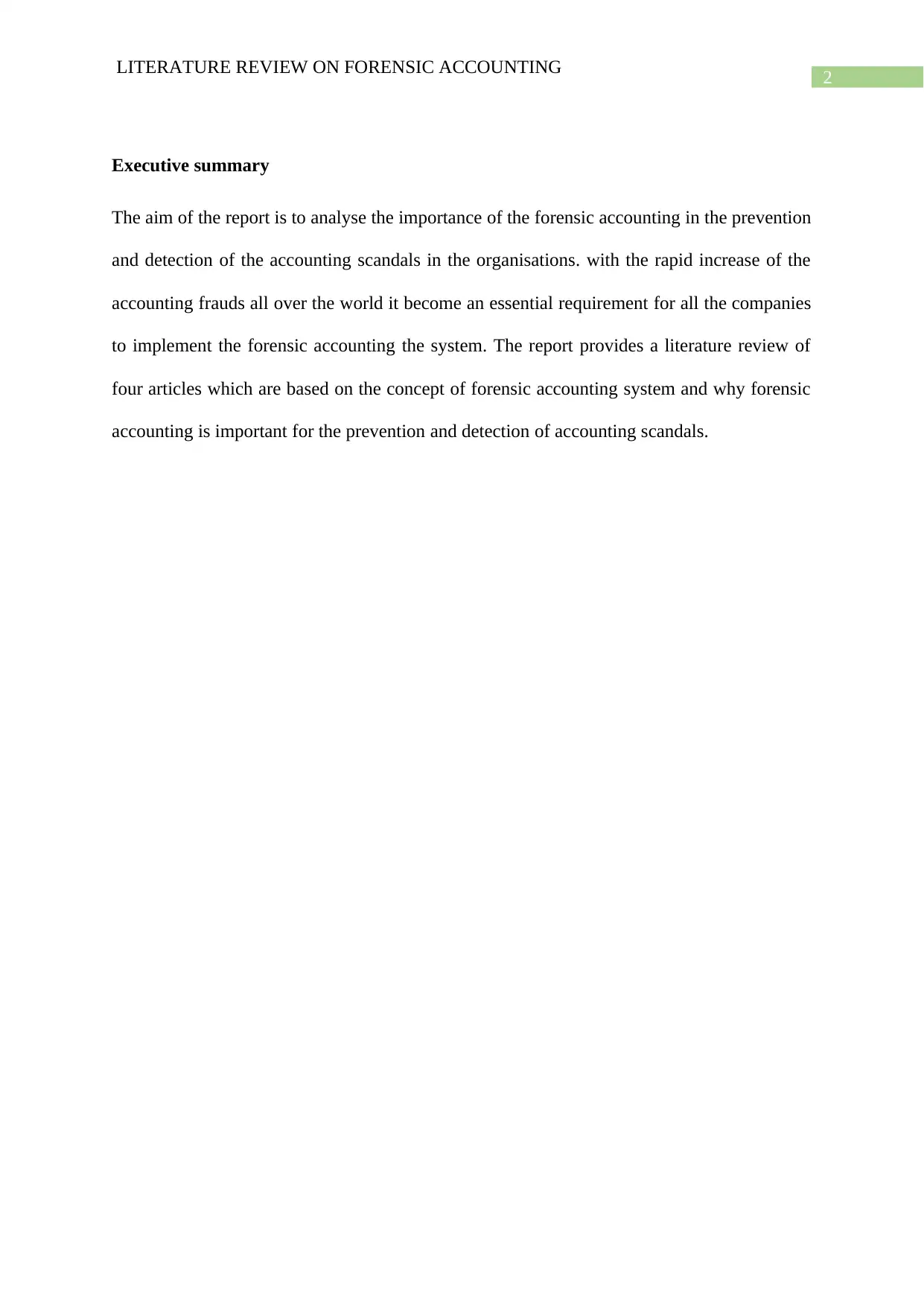
2
LITERATURE REVIEW ON FORENSIC ACCOUNTING
Executive summary
The aim of the report is to analyse the importance of the forensic accounting in the prevention
and detection of the accounting scandals in the organisations. with the rapid increase of the
accounting frauds all over the world it become an essential requirement for all the companies
to implement the forensic accounting the system. The report provides a literature review of
four articles which are based on the concept of forensic accounting system and why forensic
accounting is important for the prevention and detection of accounting scandals.
LITERATURE REVIEW ON FORENSIC ACCOUNTING
Executive summary
The aim of the report is to analyse the importance of the forensic accounting in the prevention
and detection of the accounting scandals in the organisations. with the rapid increase of the
accounting frauds all over the world it become an essential requirement for all the companies
to implement the forensic accounting the system. The report provides a literature review of
four articles which are based on the concept of forensic accounting system and why forensic
accounting is important for the prevention and detection of accounting scandals.
⊘ This is a preview!⊘
Do you want full access?
Subscribe today to unlock all pages.

Trusted by 1+ million students worldwide
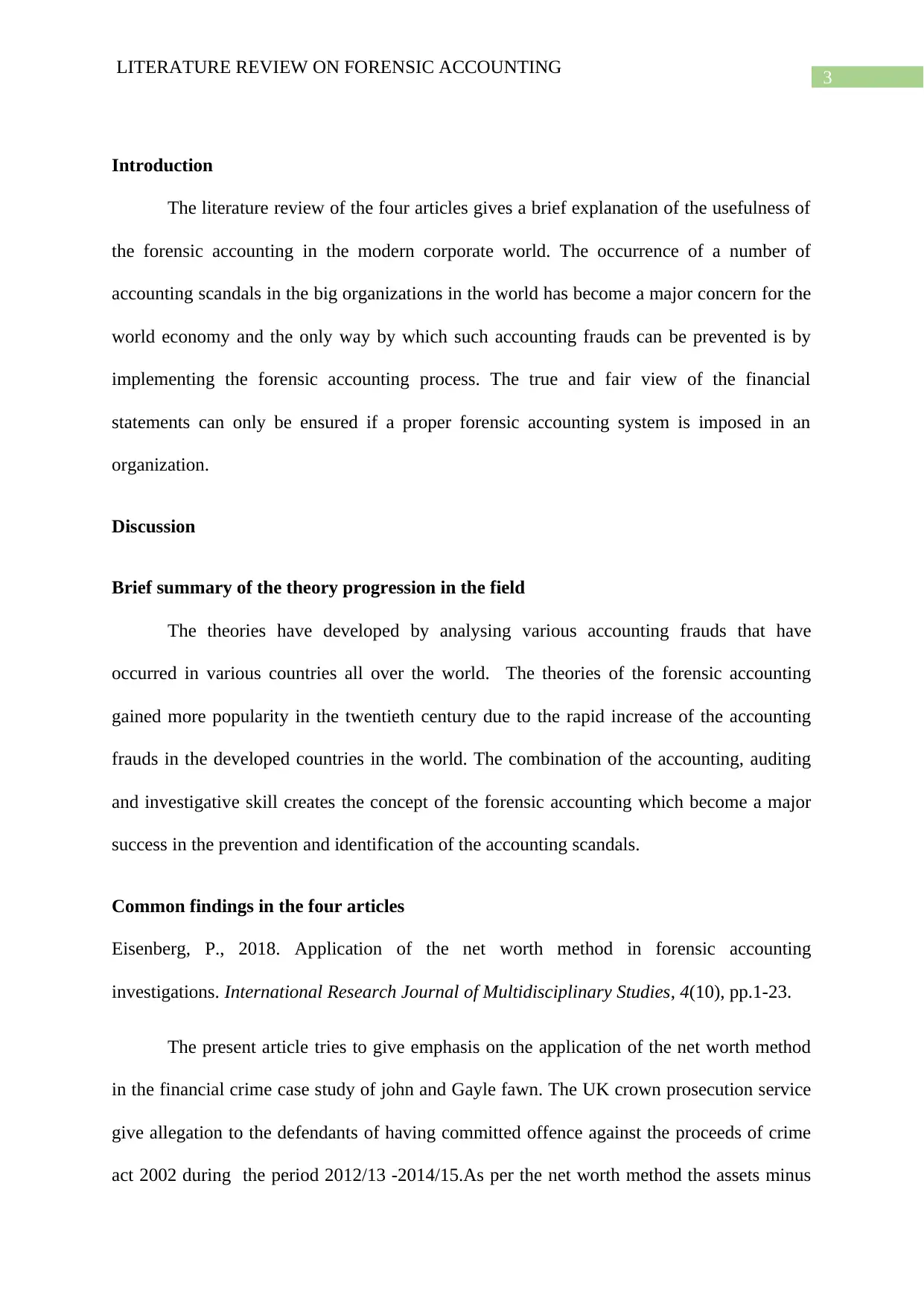
3
LITERATURE REVIEW ON FORENSIC ACCOUNTING
Introduction
The literature review of the four articles gives a brief explanation of the usefulness of
the forensic accounting in the modern corporate world. The occurrence of a number of
accounting scandals in the big organizations in the world has become a major concern for the
world economy and the only way by which such accounting frauds can be prevented is by
implementing the forensic accounting process. The true and fair view of the financial
statements can only be ensured if a proper forensic accounting system is imposed in an
organization.
Discussion
Brief summary of the theory progression in the field
The theories have developed by analysing various accounting frauds that have
occurred in various countries all over the world. The theories of the forensic accounting
gained more popularity in the twentieth century due to the rapid increase of the accounting
frauds in the developed countries in the world. The combination of the accounting, auditing
and investigative skill creates the concept of the forensic accounting which become a major
success in the prevention and identification of the accounting scandals.
Common findings in the four articles
Eisenberg, P., 2018. Application of the net worth method in forensic accounting
investigations. International Research Journal of Multidisciplinary Studies, 4(10), pp.1-23.
The present article tries to give emphasis on the application of the net worth method
in the financial crime case study of john and Gayle fawn. The UK crown prosecution service
give allegation to the defendants of having committed offence against the proceeds of crime
act 2002 during the period 2012/13 -2014/15.As per the net worth method the assets minus
LITERATURE REVIEW ON FORENSIC ACCOUNTING
Introduction
The literature review of the four articles gives a brief explanation of the usefulness of
the forensic accounting in the modern corporate world. The occurrence of a number of
accounting scandals in the big organizations in the world has become a major concern for the
world economy and the only way by which such accounting frauds can be prevented is by
implementing the forensic accounting process. The true and fair view of the financial
statements can only be ensured if a proper forensic accounting system is imposed in an
organization.
Discussion
Brief summary of the theory progression in the field
The theories have developed by analysing various accounting frauds that have
occurred in various countries all over the world. The theories of the forensic accounting
gained more popularity in the twentieth century due to the rapid increase of the accounting
frauds in the developed countries in the world. The combination of the accounting, auditing
and investigative skill creates the concept of the forensic accounting which become a major
success in the prevention and identification of the accounting scandals.
Common findings in the four articles
Eisenberg, P., 2018. Application of the net worth method in forensic accounting
investigations. International Research Journal of Multidisciplinary Studies, 4(10), pp.1-23.
The present article tries to give emphasis on the application of the net worth method
in the financial crime case study of john and Gayle fawn. The UK crown prosecution service
give allegation to the defendants of having committed offence against the proceeds of crime
act 2002 during the period 2012/13 -2014/15.As per the net worth method the assets minus
Paraphrase This Document
Need a fresh take? Get an instant paraphrase of this document with our AI Paraphraser
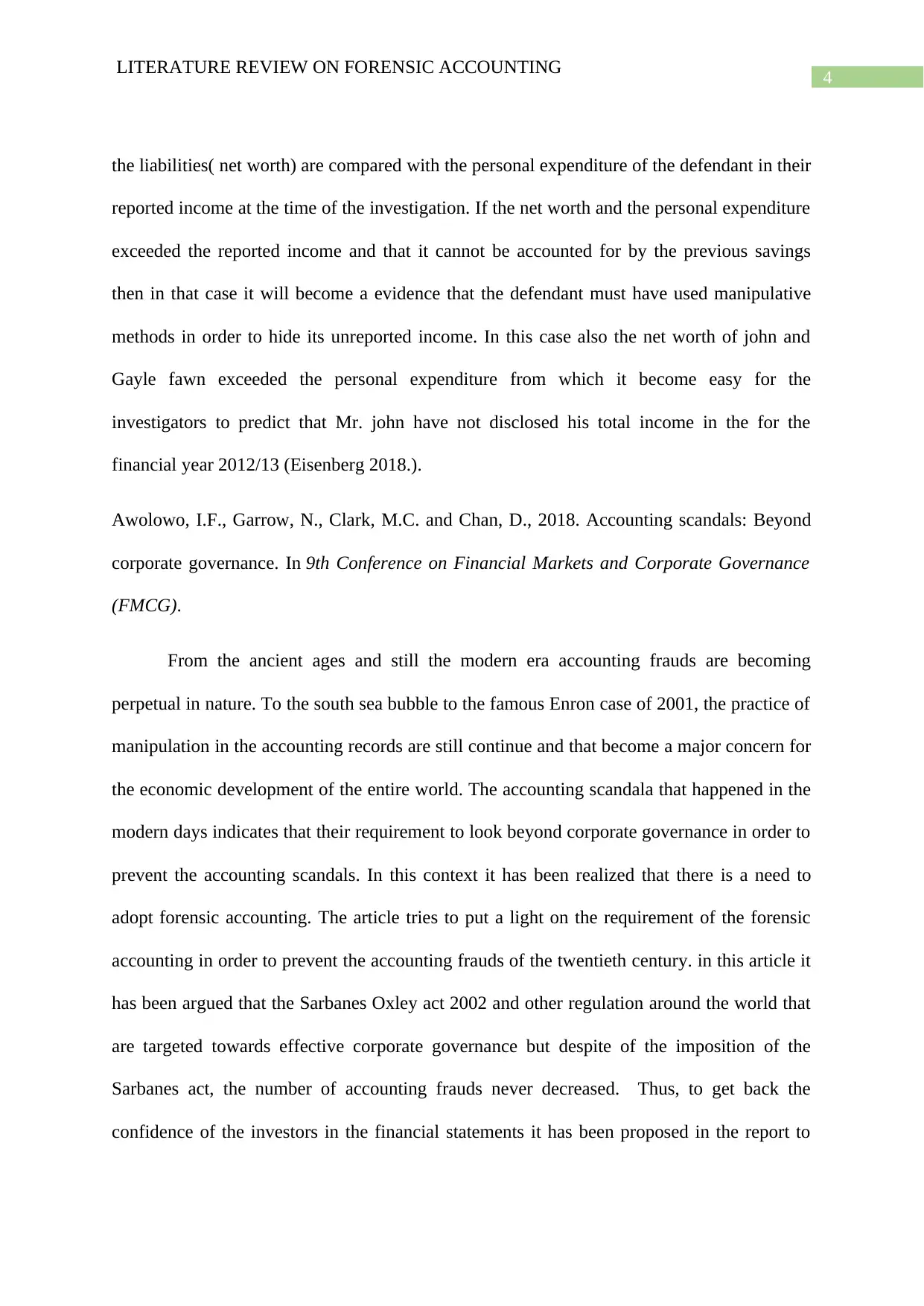
4
LITERATURE REVIEW ON FORENSIC ACCOUNTING
the liabilities( net worth) are compared with the personal expenditure of the defendant in their
reported income at the time of the investigation. If the net worth and the personal expenditure
exceeded the reported income and that it cannot be accounted for by the previous savings
then in that case it will become a evidence that the defendant must have used manipulative
methods in order to hide its unreported income. In this case also the net worth of john and
Gayle fawn exceeded the personal expenditure from which it become easy for the
investigators to predict that Mr. john have not disclosed his total income in the for the
financial year 2012/13 (Eisenberg 2018.).
Awolowo, I.F., Garrow, N., Clark, M.C. and Chan, D., 2018. Accounting scandals: Beyond
corporate governance. In 9th Conference on Financial Markets and Corporate Governance
(FMCG).
From the ancient ages and still the modern era accounting frauds are becoming
perpetual in nature. To the south sea bubble to the famous Enron case of 2001, the practice of
manipulation in the accounting records are still continue and that become a major concern for
the economic development of the entire world. The accounting scandala that happened in the
modern days indicates that their requirement to look beyond corporate governance in order to
prevent the accounting scandals. In this context it has been realized that there is a need to
adopt forensic accounting. The article tries to put a light on the requirement of the forensic
accounting in order to prevent the accounting frauds of the twentieth century. in this article it
has been argued that the Sarbanes Oxley act 2002 and other regulation around the world that
are targeted towards effective corporate governance but despite of the imposition of the
Sarbanes act, the number of accounting frauds never decreased. Thus, to get back the
confidence of the investors in the financial statements it has been proposed in the report to
LITERATURE REVIEW ON FORENSIC ACCOUNTING
the liabilities( net worth) are compared with the personal expenditure of the defendant in their
reported income at the time of the investigation. If the net worth and the personal expenditure
exceeded the reported income and that it cannot be accounted for by the previous savings
then in that case it will become a evidence that the defendant must have used manipulative
methods in order to hide its unreported income. In this case also the net worth of john and
Gayle fawn exceeded the personal expenditure from which it become easy for the
investigators to predict that Mr. john have not disclosed his total income in the for the
financial year 2012/13 (Eisenberg 2018.).
Awolowo, I.F., Garrow, N., Clark, M.C. and Chan, D., 2018. Accounting scandals: Beyond
corporate governance. In 9th Conference on Financial Markets and Corporate Governance
(FMCG).
From the ancient ages and still the modern era accounting frauds are becoming
perpetual in nature. To the south sea bubble to the famous Enron case of 2001, the practice of
manipulation in the accounting records are still continue and that become a major concern for
the economic development of the entire world. The accounting scandala that happened in the
modern days indicates that their requirement to look beyond corporate governance in order to
prevent the accounting scandals. In this context it has been realized that there is a need to
adopt forensic accounting. The article tries to put a light on the requirement of the forensic
accounting in order to prevent the accounting frauds of the twentieth century. in this article it
has been argued that the Sarbanes Oxley act 2002 and other regulation around the world that
are targeted towards effective corporate governance but despite of the imposition of the
Sarbanes act, the number of accounting frauds never decreased. Thus, to get back the
confidence of the investors in the financial statements it has been proposed in the report to
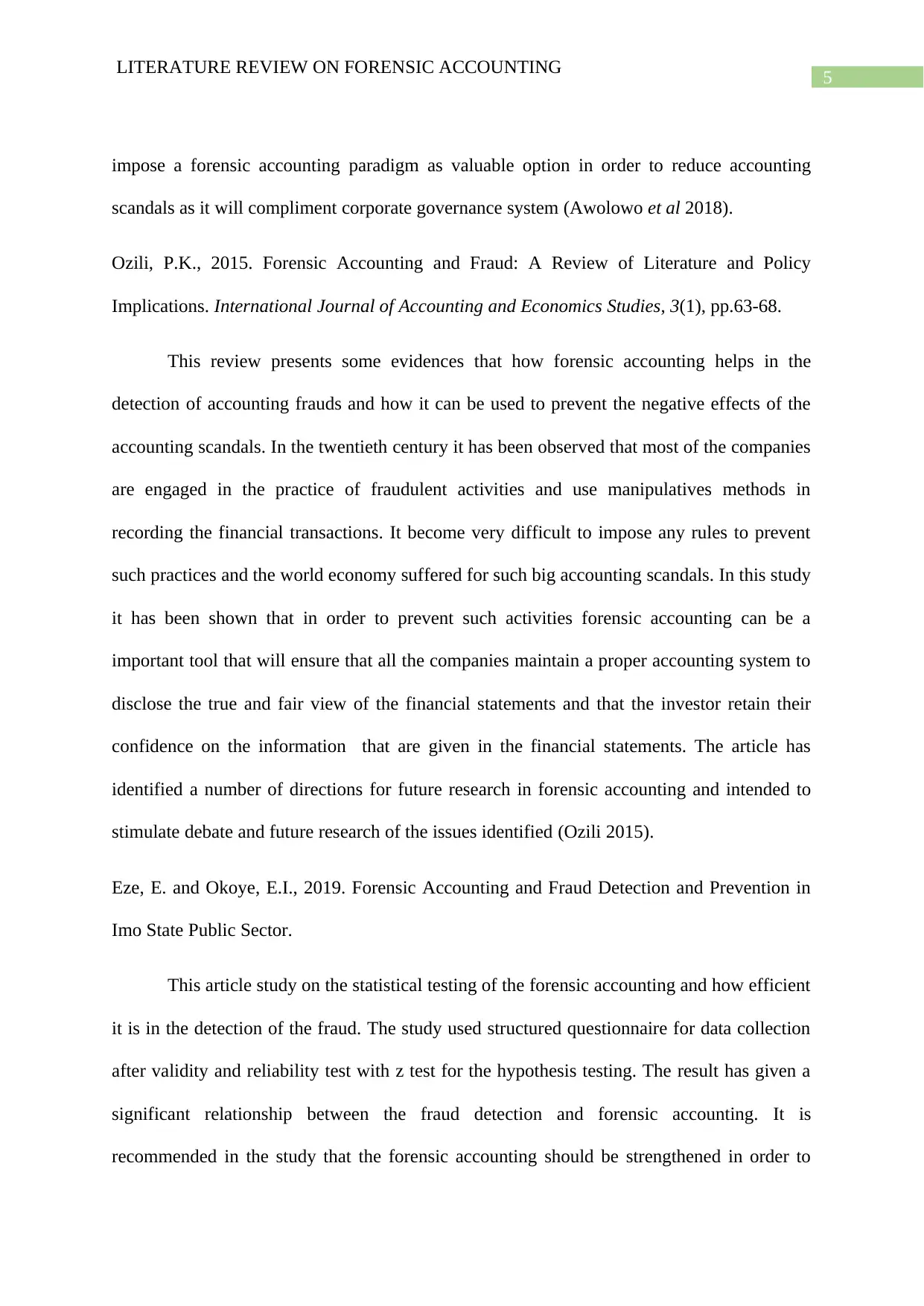
5
LITERATURE REVIEW ON FORENSIC ACCOUNTING
impose a forensic accounting paradigm as valuable option in order to reduce accounting
scandals as it will compliment corporate governance system (Awolowo et al 2018).
Ozili, P.K., 2015. Forensic Accounting and Fraud: A Review of Literature and Policy
Implications. International Journal of Accounting and Economics Studies, 3(1), pp.63-68.
This review presents some evidences that how forensic accounting helps in the
detection of accounting frauds and how it can be used to prevent the negative effects of the
accounting scandals. In the twentieth century it has been observed that most of the companies
are engaged in the practice of fraudulent activities and use manipulatives methods in
recording the financial transactions. It become very difficult to impose any rules to prevent
such practices and the world economy suffered for such big accounting scandals. In this study
it has been shown that in order to prevent such activities forensic accounting can be a
important tool that will ensure that all the companies maintain a proper accounting system to
disclose the true and fair view of the financial statements and that the investor retain their
confidence on the information that are given in the financial statements. The article has
identified a number of directions for future research in forensic accounting and intended to
stimulate debate and future research of the issues identified (Ozili 2015).
Eze, E. and Okoye, E.I., 2019. Forensic Accounting and Fraud Detection and Prevention in
Imo State Public Sector.
This article study on the statistical testing of the forensic accounting and how efficient
it is in the detection of the fraud. The study used structured questionnaire for data collection
after validity and reliability test with z test for the hypothesis testing. The result has given a
significant relationship between the fraud detection and forensic accounting. It is
recommended in the study that the forensic accounting should be strengthened in order to
LITERATURE REVIEW ON FORENSIC ACCOUNTING
impose a forensic accounting paradigm as valuable option in order to reduce accounting
scandals as it will compliment corporate governance system (Awolowo et al 2018).
Ozili, P.K., 2015. Forensic Accounting and Fraud: A Review of Literature and Policy
Implications. International Journal of Accounting and Economics Studies, 3(1), pp.63-68.
This review presents some evidences that how forensic accounting helps in the
detection of accounting frauds and how it can be used to prevent the negative effects of the
accounting scandals. In the twentieth century it has been observed that most of the companies
are engaged in the practice of fraudulent activities and use manipulatives methods in
recording the financial transactions. It become very difficult to impose any rules to prevent
such practices and the world economy suffered for such big accounting scandals. In this study
it has been shown that in order to prevent such activities forensic accounting can be a
important tool that will ensure that all the companies maintain a proper accounting system to
disclose the true and fair view of the financial statements and that the investor retain their
confidence on the information that are given in the financial statements. The article has
identified a number of directions for future research in forensic accounting and intended to
stimulate debate and future research of the issues identified (Ozili 2015).
Eze, E. and Okoye, E.I., 2019. Forensic Accounting and Fraud Detection and Prevention in
Imo State Public Sector.
This article study on the statistical testing of the forensic accounting and how efficient
it is in the detection of the fraud. The study used structured questionnaire for data collection
after validity and reliability test with z test for the hypothesis testing. The result has given a
significant relationship between the fraud detection and forensic accounting. It is
recommended in the study that the forensic accounting should be strengthened in order to
⊘ This is a preview!⊘
Do you want full access?
Subscribe today to unlock all pages.

Trusted by 1+ million students worldwide
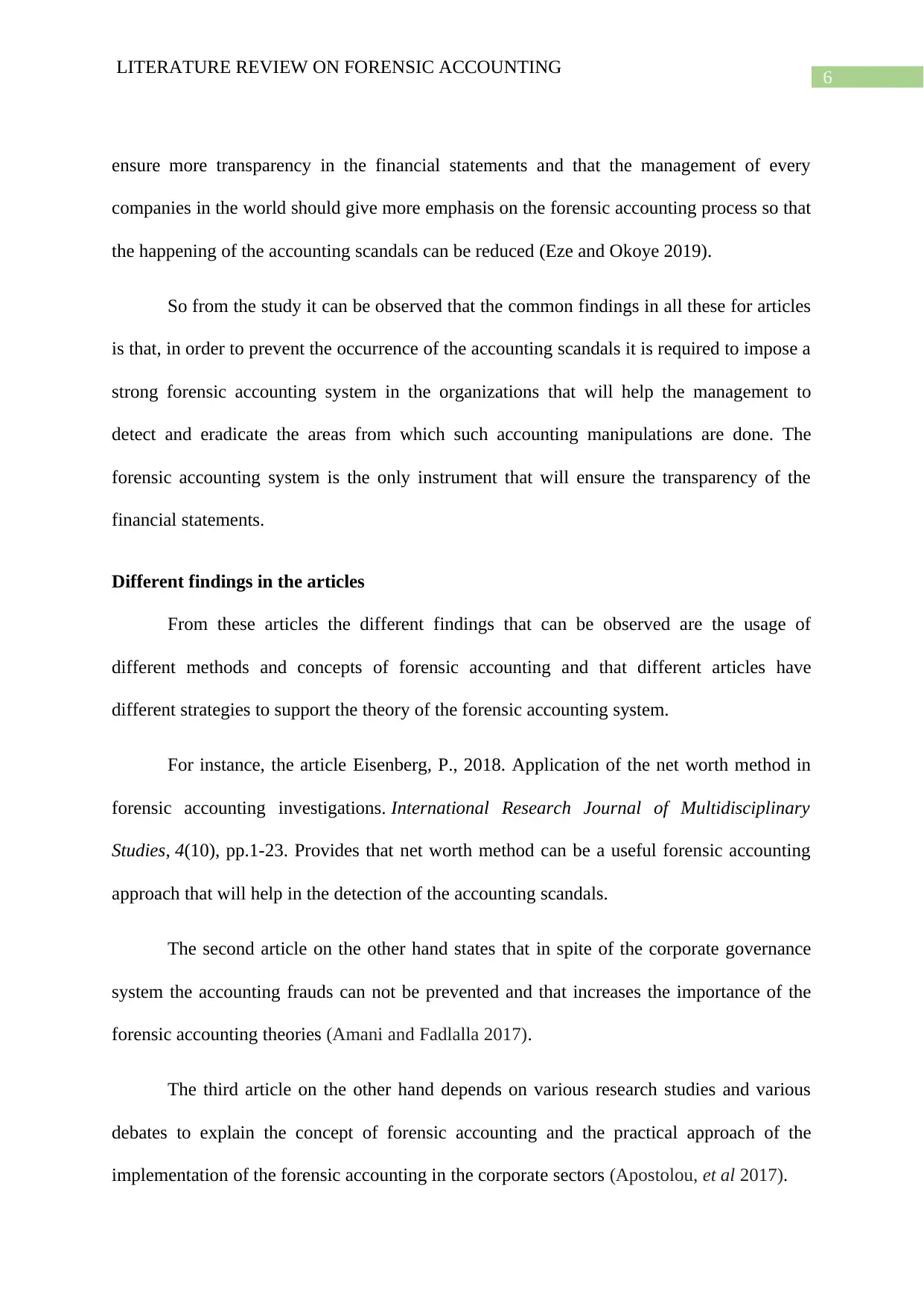
6
LITERATURE REVIEW ON FORENSIC ACCOUNTING
ensure more transparency in the financial statements and that the management of every
companies in the world should give more emphasis on the forensic accounting process so that
the happening of the accounting scandals can be reduced (Eze and Okoye 2019).
So from the study it can be observed that the common findings in all these for articles
is that, in order to prevent the occurrence of the accounting scandals it is required to impose a
strong forensic accounting system in the organizations that will help the management to
detect and eradicate the areas from which such accounting manipulations are done. The
forensic accounting system is the only instrument that will ensure the transparency of the
financial statements.
Different findings in the articles
From these articles the different findings that can be observed are the usage of
different methods and concepts of forensic accounting and that different articles have
different strategies to support the theory of the forensic accounting system.
For instance, the article Eisenberg, P., 2018. Application of the net worth method in
forensic accounting investigations. International Research Journal of Multidisciplinary
Studies, 4(10), pp.1-23. Provides that net worth method can be a useful forensic accounting
approach that will help in the detection of the accounting scandals.
The second article on the other hand states that in spite of the corporate governance
system the accounting frauds can not be prevented and that increases the importance of the
forensic accounting theories (Amani and Fadlalla 2017).
The third article on the other hand depends on various research studies and various
debates to explain the concept of forensic accounting and the practical approach of the
implementation of the forensic accounting in the corporate sectors (Apostolou, et al 2017).
LITERATURE REVIEW ON FORENSIC ACCOUNTING
ensure more transparency in the financial statements and that the management of every
companies in the world should give more emphasis on the forensic accounting process so that
the happening of the accounting scandals can be reduced (Eze and Okoye 2019).
So from the study it can be observed that the common findings in all these for articles
is that, in order to prevent the occurrence of the accounting scandals it is required to impose a
strong forensic accounting system in the organizations that will help the management to
detect and eradicate the areas from which such accounting manipulations are done. The
forensic accounting system is the only instrument that will ensure the transparency of the
financial statements.
Different findings in the articles
From these articles the different findings that can be observed are the usage of
different methods and concepts of forensic accounting and that different articles have
different strategies to support the theory of the forensic accounting system.
For instance, the article Eisenberg, P., 2018. Application of the net worth method in
forensic accounting investigations. International Research Journal of Multidisciplinary
Studies, 4(10), pp.1-23. Provides that net worth method can be a useful forensic accounting
approach that will help in the detection of the accounting scandals.
The second article on the other hand states that in spite of the corporate governance
system the accounting frauds can not be prevented and that increases the importance of the
forensic accounting theories (Amani and Fadlalla 2017).
The third article on the other hand depends on various research studies and various
debates to explain the concept of forensic accounting and the practical approach of the
implementation of the forensic accounting in the corporate sectors (Apostolou, et al 2017).
Paraphrase This Document
Need a fresh take? Get an instant paraphrase of this document with our AI Paraphraser
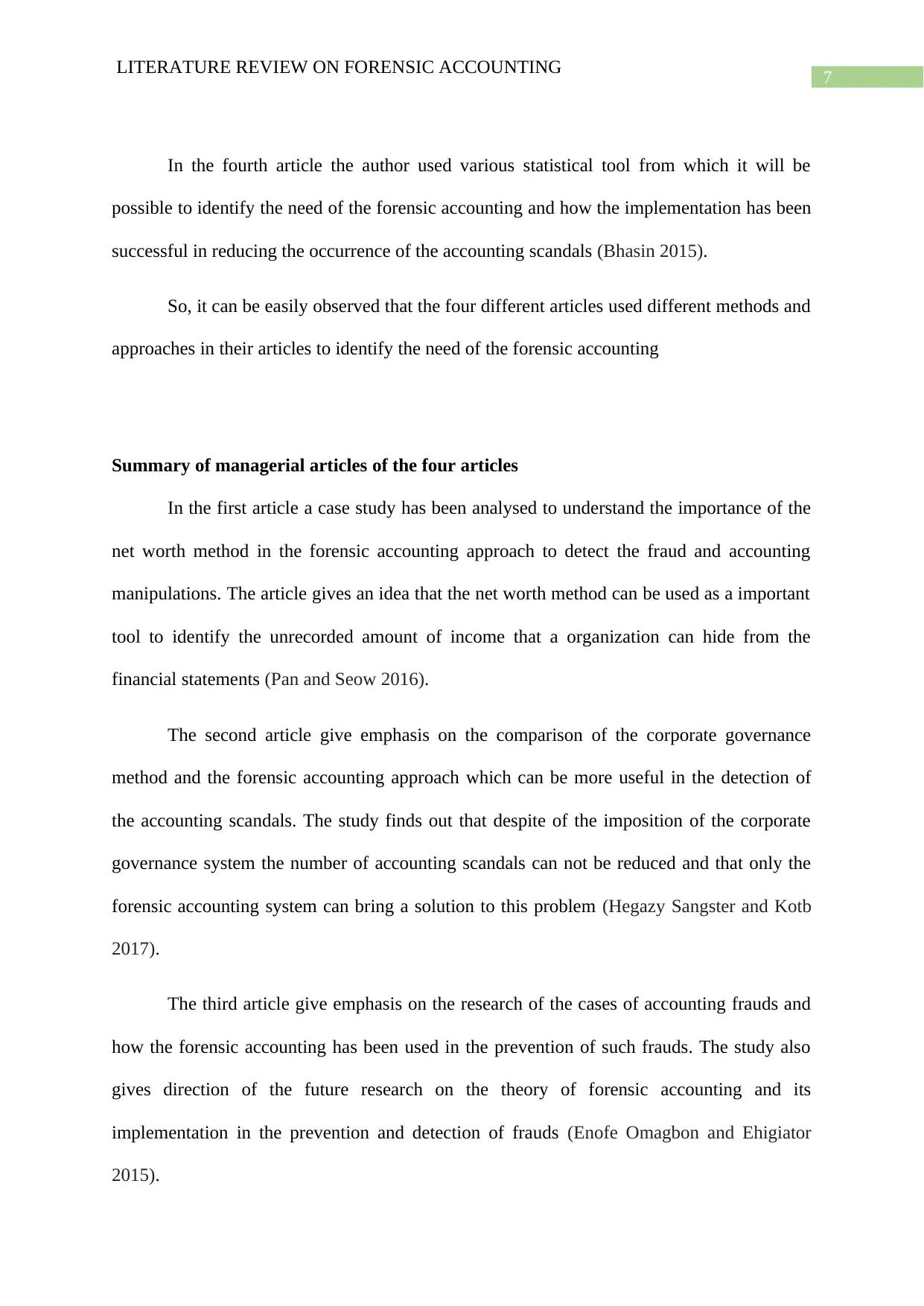
7
LITERATURE REVIEW ON FORENSIC ACCOUNTING
In the fourth article the author used various statistical tool from which it will be
possible to identify the need of the forensic accounting and how the implementation has been
successful in reducing the occurrence of the accounting scandals (Bhasin 2015).
So, it can be easily observed that the four different articles used different methods and
approaches in their articles to identify the need of the forensic accounting
Summary of managerial articles of the four articles
In the first article a case study has been analysed to understand the importance of the
net worth method in the forensic accounting approach to detect the fraud and accounting
manipulations. The article gives an idea that the net worth method can be used as a important
tool to identify the unrecorded amount of income that a organization can hide from the
financial statements (Pan and Seow 2016).
The second article give emphasis on the comparison of the corporate governance
method and the forensic accounting approach which can be more useful in the detection of
the accounting scandals. The study finds out that despite of the imposition of the corporate
governance system the number of accounting scandals can not be reduced and that only the
forensic accounting system can bring a solution to this problem (Hegazy Sangster and Kotb
2017).
The third article give emphasis on the research of the cases of accounting frauds and
how the forensic accounting has been used in the prevention of such frauds. The study also
gives direction of the future research on the theory of forensic accounting and its
implementation in the prevention and detection of frauds (Enofe Omagbon and Ehigiator
2015).
LITERATURE REVIEW ON FORENSIC ACCOUNTING
In the fourth article the author used various statistical tool from which it will be
possible to identify the need of the forensic accounting and how the implementation has been
successful in reducing the occurrence of the accounting scandals (Bhasin 2015).
So, it can be easily observed that the four different articles used different methods and
approaches in their articles to identify the need of the forensic accounting
Summary of managerial articles of the four articles
In the first article a case study has been analysed to understand the importance of the
net worth method in the forensic accounting approach to detect the fraud and accounting
manipulations. The article gives an idea that the net worth method can be used as a important
tool to identify the unrecorded amount of income that a organization can hide from the
financial statements (Pan and Seow 2016).
The second article give emphasis on the comparison of the corporate governance
method and the forensic accounting approach which can be more useful in the detection of
the accounting scandals. The study finds out that despite of the imposition of the corporate
governance system the number of accounting scandals can not be reduced and that only the
forensic accounting system can bring a solution to this problem (Hegazy Sangster and Kotb
2017).
The third article give emphasis on the research of the cases of accounting frauds and
how the forensic accounting has been used in the prevention of such frauds. The study also
gives direction of the future research on the theory of forensic accounting and its
implementation in the prevention and detection of frauds (Enofe Omagbon and Ehigiator
2015).
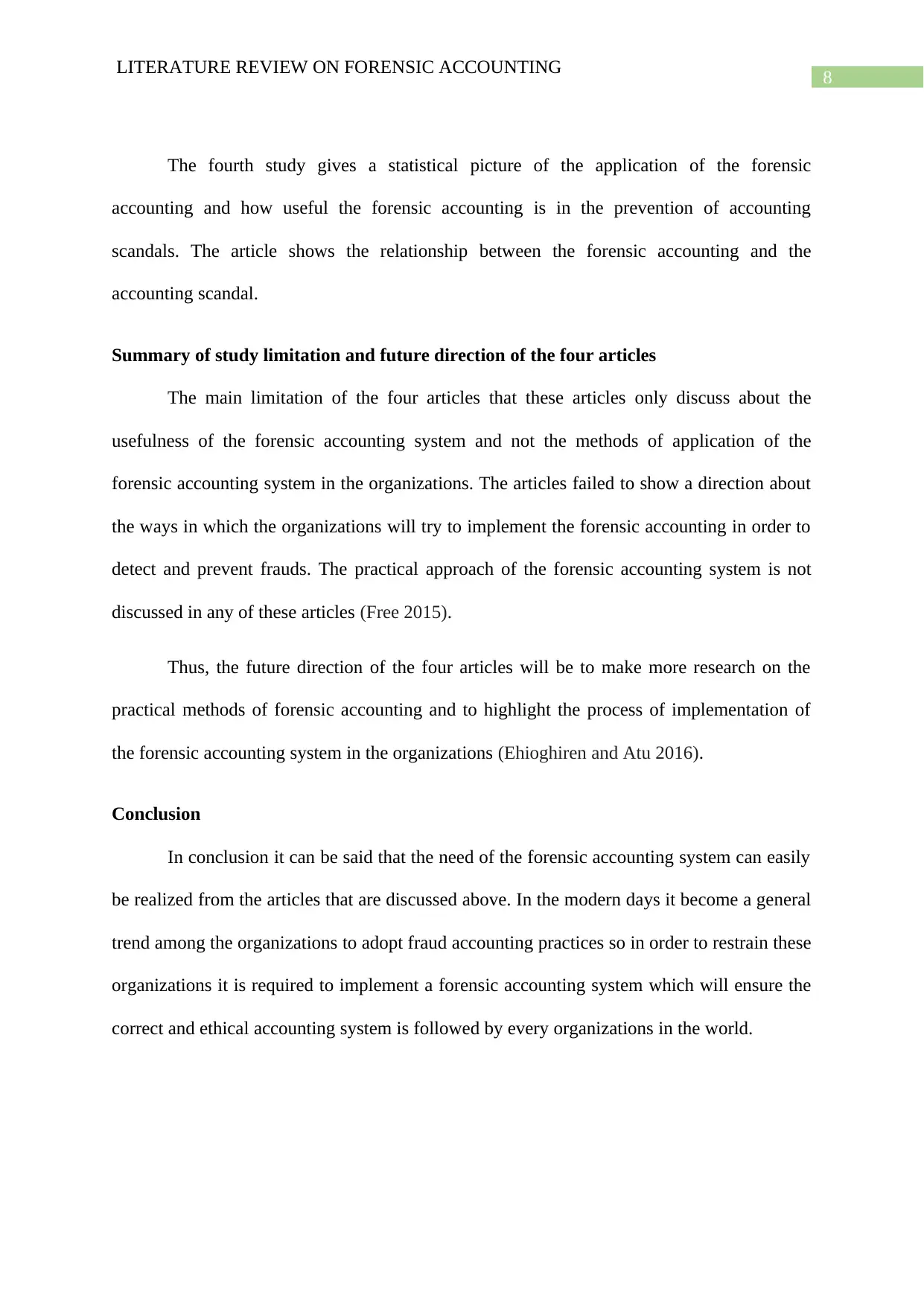
8
LITERATURE REVIEW ON FORENSIC ACCOUNTING
The fourth study gives a statistical picture of the application of the forensic
accounting and how useful the forensic accounting is in the prevention of accounting
scandals. The article shows the relationship between the forensic accounting and the
accounting scandal.
Summary of study limitation and future direction of the four articles
The main limitation of the four articles that these articles only discuss about the
usefulness of the forensic accounting system and not the methods of application of the
forensic accounting system in the organizations. The articles failed to show a direction about
the ways in which the organizations will try to implement the forensic accounting in order to
detect and prevent frauds. The practical approach of the forensic accounting system is not
discussed in any of these articles (Free 2015).
Thus, the future direction of the four articles will be to make more research on the
practical methods of forensic accounting and to highlight the process of implementation of
the forensic accounting system in the organizations (Ehioghiren and Atu 2016).
Conclusion
In conclusion it can be said that the need of the forensic accounting system can easily
be realized from the articles that are discussed above. In the modern days it become a general
trend among the organizations to adopt fraud accounting practices so in order to restrain these
organizations it is required to implement a forensic accounting system which will ensure the
correct and ethical accounting system is followed by every organizations in the world.
LITERATURE REVIEW ON FORENSIC ACCOUNTING
The fourth study gives a statistical picture of the application of the forensic
accounting and how useful the forensic accounting is in the prevention of accounting
scandals. The article shows the relationship between the forensic accounting and the
accounting scandal.
Summary of study limitation and future direction of the four articles
The main limitation of the four articles that these articles only discuss about the
usefulness of the forensic accounting system and not the methods of application of the
forensic accounting system in the organizations. The articles failed to show a direction about
the ways in which the organizations will try to implement the forensic accounting in order to
detect and prevent frauds. The practical approach of the forensic accounting system is not
discussed in any of these articles (Free 2015).
Thus, the future direction of the four articles will be to make more research on the
practical methods of forensic accounting and to highlight the process of implementation of
the forensic accounting system in the organizations (Ehioghiren and Atu 2016).
Conclusion
In conclusion it can be said that the need of the forensic accounting system can easily
be realized from the articles that are discussed above. In the modern days it become a general
trend among the organizations to adopt fraud accounting practices so in order to restrain these
organizations it is required to implement a forensic accounting system which will ensure the
correct and ethical accounting system is followed by every organizations in the world.
⊘ This is a preview!⊘
Do you want full access?
Subscribe today to unlock all pages.

Trusted by 1+ million students worldwide
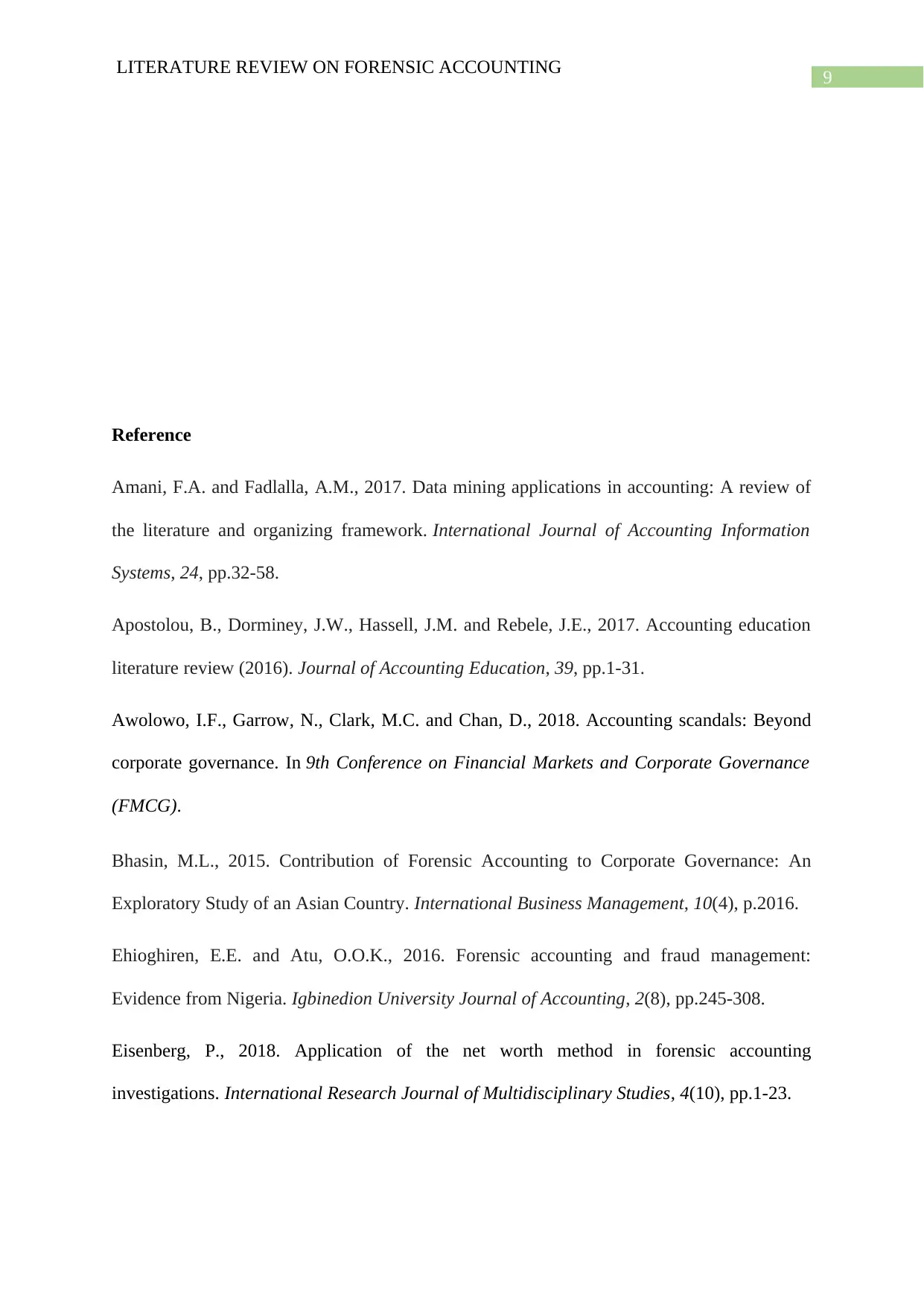
9
LITERATURE REVIEW ON FORENSIC ACCOUNTING
Reference
Amani, F.A. and Fadlalla, A.M., 2017. Data mining applications in accounting: A review of
the literature and organizing framework. International Journal of Accounting Information
Systems, 24, pp.32-58.
Apostolou, B., Dorminey, J.W., Hassell, J.M. and Rebele, J.E., 2017. Accounting education
literature review (2016). Journal of Accounting Education, 39, pp.1-31.
Awolowo, I.F., Garrow, N., Clark, M.C. and Chan, D., 2018. Accounting scandals: Beyond
corporate governance. In 9th Conference on Financial Markets and Corporate Governance
(FMCG).
Bhasin, M.L., 2015. Contribution of Forensic Accounting to Corporate Governance: An
Exploratory Study of an Asian Country. International Business Management, 10(4), p.2016.
Ehioghiren, E.E. and Atu, O.O.K., 2016. Forensic accounting and fraud management:
Evidence from Nigeria. Igbinedion University Journal of Accounting, 2(8), pp.245-308.
Eisenberg, P., 2018. Application of the net worth method in forensic accounting
investigations. International Research Journal of Multidisciplinary Studies, 4(10), pp.1-23.
LITERATURE REVIEW ON FORENSIC ACCOUNTING
Reference
Amani, F.A. and Fadlalla, A.M., 2017. Data mining applications in accounting: A review of
the literature and organizing framework. International Journal of Accounting Information
Systems, 24, pp.32-58.
Apostolou, B., Dorminey, J.W., Hassell, J.M. and Rebele, J.E., 2017. Accounting education
literature review (2016). Journal of Accounting Education, 39, pp.1-31.
Awolowo, I.F., Garrow, N., Clark, M.C. and Chan, D., 2018. Accounting scandals: Beyond
corporate governance. In 9th Conference on Financial Markets and Corporate Governance
(FMCG).
Bhasin, M.L., 2015. Contribution of Forensic Accounting to Corporate Governance: An
Exploratory Study of an Asian Country. International Business Management, 10(4), p.2016.
Ehioghiren, E.E. and Atu, O.O.K., 2016. Forensic accounting and fraud management:
Evidence from Nigeria. Igbinedion University Journal of Accounting, 2(8), pp.245-308.
Eisenberg, P., 2018. Application of the net worth method in forensic accounting
investigations. International Research Journal of Multidisciplinary Studies, 4(10), pp.1-23.
Paraphrase This Document
Need a fresh take? Get an instant paraphrase of this document with our AI Paraphraser
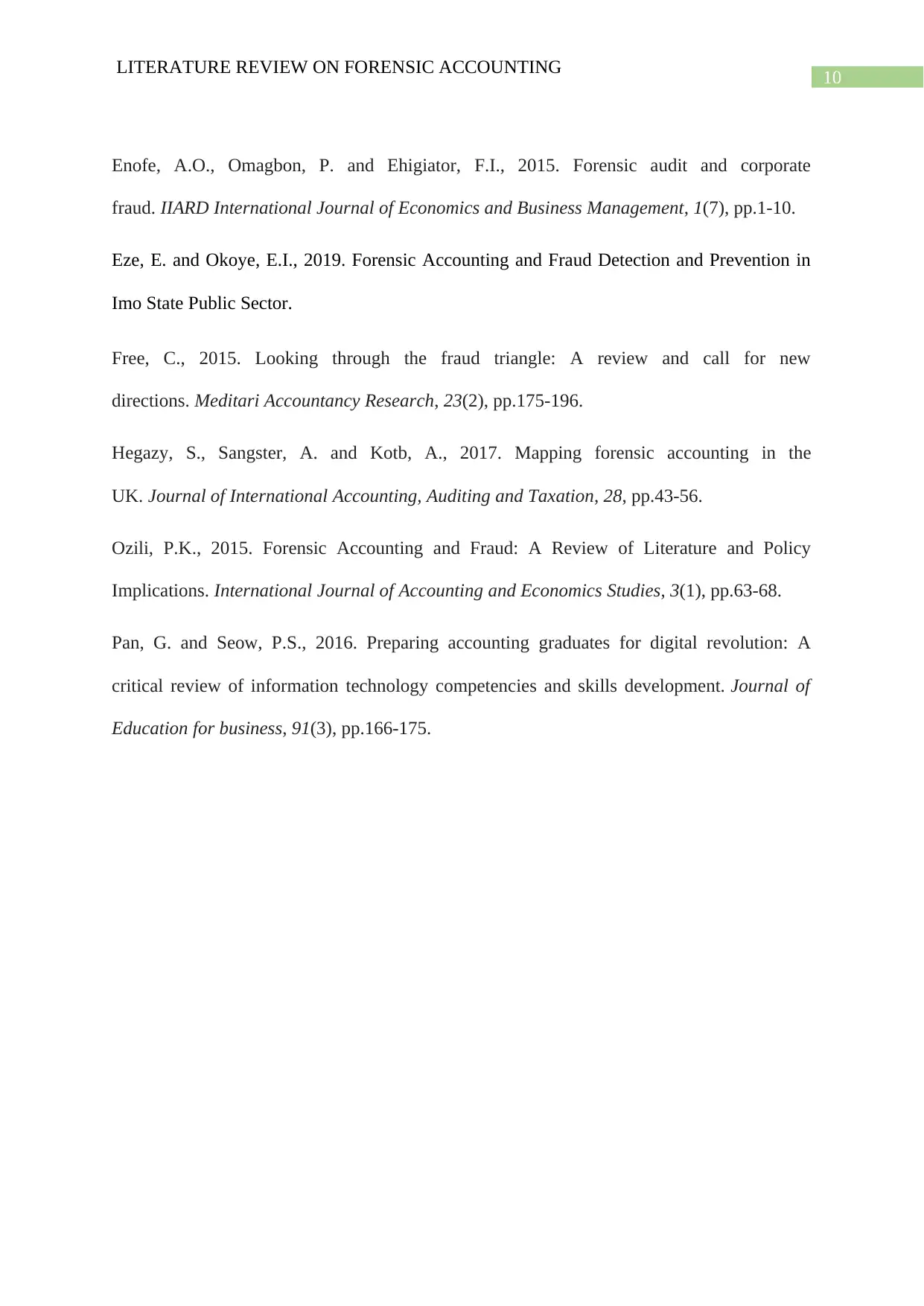
10
LITERATURE REVIEW ON FORENSIC ACCOUNTING
Enofe, A.O., Omagbon, P. and Ehigiator, F.I., 2015. Forensic audit and corporate
fraud. IIARD International Journal of Economics and Business Management, 1(7), pp.1-10.
Eze, E. and Okoye, E.I., 2019. Forensic Accounting and Fraud Detection and Prevention in
Imo State Public Sector.
Free, C., 2015. Looking through the fraud triangle: A review and call for new
directions. Meditari Accountancy Research, 23(2), pp.175-196.
Hegazy, S., Sangster, A. and Kotb, A., 2017. Mapping forensic accounting in the
UK. Journal of International Accounting, Auditing and Taxation, 28, pp.43-56.
Ozili, P.K., 2015. Forensic Accounting and Fraud: A Review of Literature and Policy
Implications. International Journal of Accounting and Economics Studies, 3(1), pp.63-68.
Pan, G. and Seow, P.S., 2016. Preparing accounting graduates for digital revolution: A
critical review of information technology competencies and skills development. Journal of
Education for business, 91(3), pp.166-175.
LITERATURE REVIEW ON FORENSIC ACCOUNTING
Enofe, A.O., Omagbon, P. and Ehigiator, F.I., 2015. Forensic audit and corporate
fraud. IIARD International Journal of Economics and Business Management, 1(7), pp.1-10.
Eze, E. and Okoye, E.I., 2019. Forensic Accounting and Fraud Detection and Prevention in
Imo State Public Sector.
Free, C., 2015. Looking through the fraud triangle: A review and call for new
directions. Meditari Accountancy Research, 23(2), pp.175-196.
Hegazy, S., Sangster, A. and Kotb, A., 2017. Mapping forensic accounting in the
UK. Journal of International Accounting, Auditing and Taxation, 28, pp.43-56.
Ozili, P.K., 2015. Forensic Accounting and Fraud: A Review of Literature and Policy
Implications. International Journal of Accounting and Economics Studies, 3(1), pp.63-68.
Pan, G. and Seow, P.S., 2016. Preparing accounting graduates for digital revolution: A
critical review of information technology competencies and skills development. Journal of
Education for business, 91(3), pp.166-175.
1 out of 11
Related Documents
Your All-in-One AI-Powered Toolkit for Academic Success.
+13062052269
info@desklib.com
Available 24*7 on WhatsApp / Email
![[object Object]](/_next/static/media/star-bottom.7253800d.svg)
Unlock your academic potential
Copyright © 2020–2026 A2Z Services. All Rights Reserved. Developed and managed by ZUCOL.



